Subscribe to the Newsletter
If you are interested in understanding how Traditional Chinese Medicine can improve your life sign up to my newsletter for the latest updates.

Key Learning Points
Insomnia treatment? Here’s a different way to make sense of all the advice out there, to discover why some tips are better than others and so help yourself sleep well again.
Here are the accepted symptoms of insomnia:
And, associated with these:
Before we can talk about effective treatment, let’s start with what we don’t mean by insomnia!! If you can’t sleep because of an existing illness or temporary change in circumstances, then probably that needs to be sorted out first.
For example, if you can’t sleep because:
Sorry! All those are excellent reasons for your sleeplessness and Chinese Medicine may be able to help them, but they’re NOT the subject of this page.
In some cases it’s your own fault – for example you’ve drunk too much coffee!
In others, once the underlying illness is cured your sleeplessness will go, meaning that your problem is secondary to something else e.g.:
Willingly or otherwise, you’ve arrived on a page that explains insomnia and sleep disorders from a different point of view – that of Chinese medicine. Chinese medicine began who knows when, but there are written records going back 3000 years, with a world-view, or rather a universe-view, that modern scientists and philosophers have only recently begun to appreciate.
This way of looking at life and health continues to make a huge impression on those who have seen it in action, and it is used by people and in medical practices and large hospitals round the world.
Adaptations of it include what is called Battlefield Acupuncture, developed by the United States Army Medical Corps.
Further down this page you can read how Chinese medicine fits insomnia into its ideas about Yin and Yang.
Based on Yin and Yang, if you can’t sleep or find sleeping difficult you
There. That wasn’t too bad was it? We come back to it further down the page!
Insomnia comes in many forms. Click the links to find out more:
According to Sleep, (doi.org/68b) less than 6 hours of sleep a night makes you more susceptible to catching colds.
A study of 160 people given cold virus nasal drops showed that those averaging under 6 hours sleep were four times as likely to catch a cold as compared with those who got more than 7 hours nightly.
Interesting research by Chinese and Australian researchers – see https://www.jcm.co.uk/news/post/acupuncture-superior-to-drugs-for-insomnia.html
Sleep well and stay well!
Imagine a hot air balloon, held down by a large bucket containing liquids and fuel. If you like, the balloon represents your mind and the bucket your body. The bucket’s contents represent your reserves of energy and the liquids in your body.
As it’s a hot air balloon, it burns the liquids to heat the air in the balloon to make it rise up.
In Chinese Medicine terms the balloon is Yang (tries to expand and rise) and the bucket and its contents Yin (tries to contract and descend). Click Yin and Yang to read more on this.
When you’re awake, the balloon (Yang – your Mind – click here for what Chinese medicine thinks about your Mind) is warm and it easily floats upwards, untroubled by sleepiness.
This might be after a good night’s sleep, when you emerge in a positive frame of mind and looking forward to the day ahead.
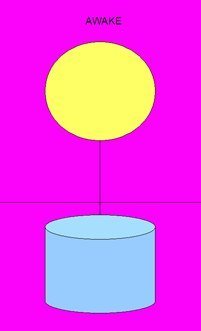
Conversely, when you are tired and want to lie down…
…after you’ve used up the reserves in the tank, the balloon is less hot and sinks downwards.
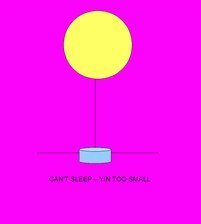
When the bucket is too small, or doesn’t contain enough counterweight, just the fuel, the balloon ascends too easily because there isn’t enough to hold it down.
If your bucket is too small, possibly you are a small child or an elderly person.
In both cases, your body can’t easily ‘contain’ enough liquid so it can’t outweigh your Yang and Mind energy.
Here even a little heat is enough to raise the balloon. (Babies with small bodies can be hard to settle. Older people have shrunken bodies or depleted liquids that don’t contain enough Yin factors to keep them asleep.)
Much the same applies if there aren’t enough liquids. Perhaps:
If your mind is too active, or you’re high on excitement (or drugs), or you’re too hot perhaps from dancing or exercise, then your Yang is too strong for your Yin, at least until the Yang (your Mind and your heat) has cooled down a bit.
This is not uncommon the night before a big event, a journey, a holiday or a party.
Of course, it also covers when you have a fever or when the weather is too hot. And it covers when you are distraught, mortified or upset by an event which has shocked your mind out of its equilibrium, a bit like a car alarm that can’t be turned off.
You also see this in people who have become a bit manic. Bipolar individuals can suffer from this.
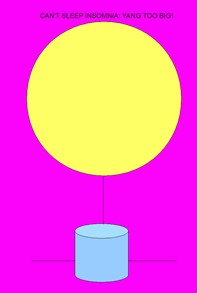
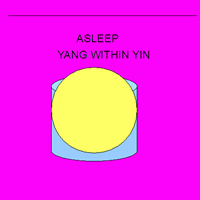
As mentioned, the balloon is Yang, the bucket is Yin and so are its contents. To get to sleep and to stay sleep, you need enough Yin (an adequately-sized bucket with enough liquid), and reduced Yang (a reducing flame and hence a cooler balloon).
When you are comfortably asleep, Yang rests within Yin: your Mind rests within the body.
Then, in the morning, after a good sleep, your Yang-Mind is reinvigorated from its rest within your Yin-Body, and your Yin-Body energy is refreshed from having had the presence of your Yang. Up you get, feeling great!
Chinese Medicine has words to describe these ‘balloon’ analogy conditions, and if your insomnia can be recognised as being due, for instance, to ‘excess Yang‘ or ‘deficient Yin‘ then it can probably be treated. These descriptions are syndromes in Chinese medicine which has developed far beyond these basic ideas. It now includes syndromes like Energy (‘Qi‘) deficiency, Liver Blood Deficiency, Heart Blood stasis and Liver Fire to explain different kinds of insomnia and the sleep disorders we experience.

Stay in Touch!
No spam, only notifications about new articles and updates.

Book a Video consultation if you want to know more about your symptoms
If you’re interested in how Chinese Medicine explains insomnia and effective insomnia treatment, down below is a flowchart. It covers the main basic (Chinese Medical) syndromes in insomnia and their distinguishing features.
Below the flowchart you’ll see for each syndrome the probable best insomnia treatment that you can do yourself.
Later, you’ll see what each kind of insomnia treatment is probably good for.
If your problem is in a circle with a blue background then look at the green boxes where the arrows from that circle go and see if you have any symptoms like those described.
Not all the symptoms of that particular syndrome are described in the box (the box is too small!) and you can check out a fuller picture for that syndrome by clicking on the link further down the page.
You may well have more than one syndrome! In that case, a skilled acupuncturist has to decide from your symptoms, case history, your pulse and tongue and possibly other information, which factors are the main ones. He must then choose which syndrome(s) to treat first.
The syndromes shown cover most of the situations, but not all. There are others. For example, you may wonder which insomnia treatment is best for the effects of a remaining pathogenic factor or from the consequences of previous conditions and the treatments you received. What remains is a kind of ‘Heat’ or excess Yang.
Such ‘Heat’ or excess Yang, can appear in a number of ways: thirst, restlessness, unpleasant dreams, tendency to worry (or get stressed) too much; it may make you sleep very lightly or be easily disturbed: you may develop a tendency to inflammation (skin, throat, bladder etc).
This Heat comes at a cost: you may be low on energy and you may get cold easily, because the Heat your body is producing isn’t going into producing energy and warmth. Instead it’s going into inflammation.
Such ‘stray’ Heat or excess Yang depletes your Yin energy, leading to the development of some of the syndromes that are mentioned, like Liver Yin deficiency, or Heart Yin deficiency.
If you’ve suffered insomnia for a long period, almost certainly more than one syndrome will be involved. Go and see an expert! (And please! Give the expert time to treat you – your health may need more than just one treatment!)
By the way, on other pages here we talk about many of the factors and thinking behind Chinese Medicine’s approach to insomnia, what you can to do help yourself, why they might work, and when they might not.
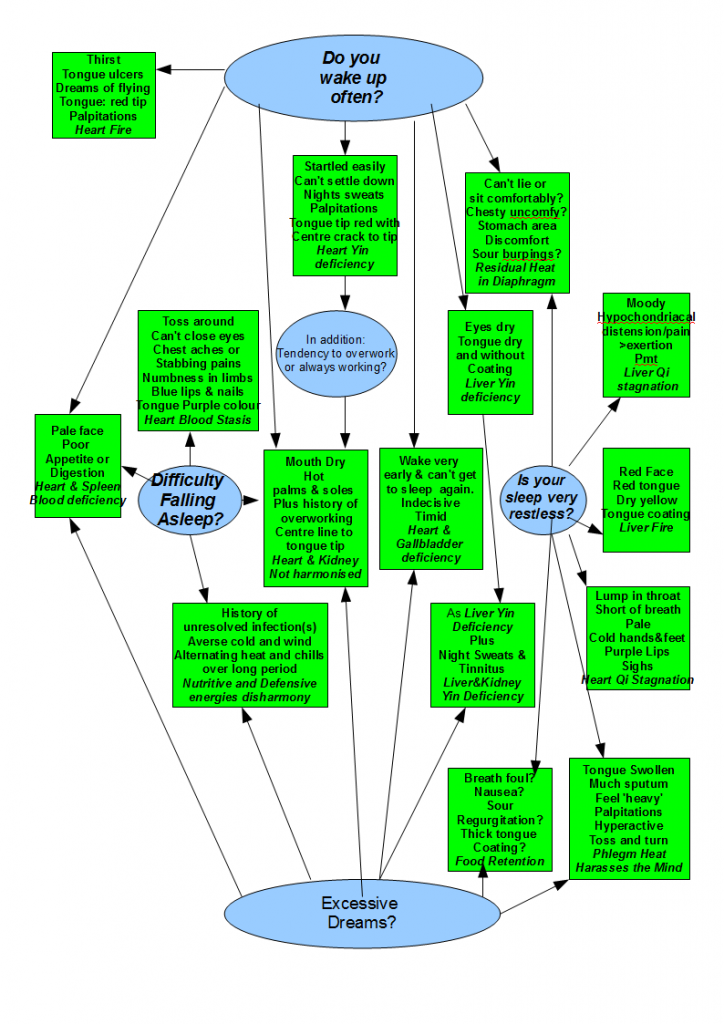
The following syndromes have too much of the wrong kind of energy?
If you’ve had insomnia for only a few days, or even just a very few weeks, with no obvious reason for it and you aren’t aware of any change of habits that preceded its onset, you’ll probably resist the idea that making some simple changes to your life and habits will make any difference.
Perhaps you’re right! But just in case … if you aren’t aware of any possible cause for it, I suggest you get someone else to ask you questions. Ideally they would be qualified – an acupuncturist comes to mind – and able to persist and ask you searching questions about your recent life.
That may uncover something you thought was unimportant at the time such as (but this is not an all-inclusive list, just things patients have told me about themselves over the years, not realising their significance for the start of their insomnia):
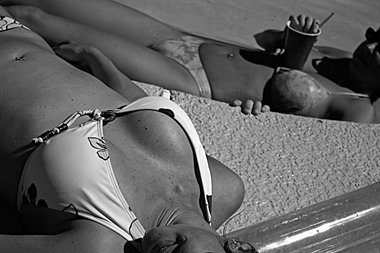
© Rebecca Abell
Dreamstime Stock Photos
See also our page on Reasons for Insomnia.
From this list or from thinking about the question with someone else, you may uncover something that suggests either too much Yang or not enough Yin.
Actually, that’s not quite the end of it. You could have too much Yin as well and there are several ways this might happen.
If you grasped the balloon analogy above, you’ll realise that where you sleep should have Yin characteristics.
If you are experiencing sleep disorders, before you start taking medication, do consider seeing an acupuncturist!
Copied from above, here’s a list of pages we’ve written about different aspects of insomnia:

Why You get Nervous Stomach Anxiety and How to Handle It. Acupuncture has great ways to help.
Subscribe to the Newsletter
If you are interested in understanding how Traditional Chinese Medicine can improve your life sign up to my newsletter for the latest updates.
Subscribe to the Newsletter
If you are interested in understanding how Traditional Chinese Medicine can improve your life sign up to my newsletter for the latest updates.